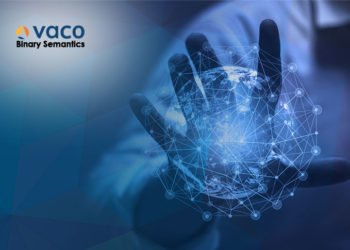Digital transformation is the need of the hour. Every business recognizes this aspect. The CXO Conference and Panel Discussion hosted by Vaco Binary Semantics LLP held on April 19, 2018 concentrates on these aspects. This is a part of the agenda of the discussion on ‘Digital Transformation for Enabling World Class Sustainable Organization’. Let us now see the importance of digital transformation and blockchain technology in particular.
In this era of data theft and manipulation, thanks to the Cambridge Analytica Fiasco, security of data has become the hot topic of discussion. It is under these circumstances that Blockchain technology is making its presence felt. The greatest advantage of Blockchain technology is that it is entirely decentralized. When we say decentralized, we mean that the network operates on a peer-to-peer basis. Hence, you see the disappearance of the middleman from the scene.
What exactly is Blockchain?
In very simple terms, blockchain is an encrypted digital ledger where you have the recording of transactions chronologically and publicly. Since it is a peer-to-peer network, making changes or alterations to the data in any given block is impossible without changing all the subsequent blocks. This example will sort out things in proper perspective.
- Someone requests for a transaction (It can be anything like financial, contracts, records, any information)
- This request is relayed to a P2P network that consists of a number of computers known as nodes.
- The next step is the validation of the transaction by the network of nodes using a set of algorithms.
- Once the transaction is verified, it is combined with other similar transactions in a new block. This block is then added to the existing blocks in such a way that it becomes unalterable.
- This completes the transaction.
Uses of Blockchain Technology:
The financial sector has great use for this technology. The land register records are another area where the blockchain technology has a great scope. This technology is very useful for people to search for the old records and establish the chain of ownership of land. This is how you find the encumbrance certificates of land. Every transaction is recorded publicly. You will not be able to modify any existing transaction but only add to it. In case of the property changes hands, you will be able to establish whether there is any charge on the property. If there is one, subsequent transactions relating to the property are invalid until the charge is extinguished by the parties creating the charge.
People consider blockchain technology as having uses in controlling cryptocurrency transactions alone. It is true that this technology was developed for this purpose alone. But, since then, it has moved on to encompass other spheres as well. We have just seen the simple example of ownership of assets like property. You can extend it to shares, copyrights, etc.
The greatest advantage of blockchain technology is that the blockchain database is not stored at a single location. The data is virtually available to the public and is verifiable. As there is no centralization of data, hacking the information is next to impossible. Even if you tried to hack, you have to create a block. This block has to be verified by the network of nodes before being added to the chain. Now, this would involve a lot of people. In the extreme eventuality of the block being added, it will remain perfectly visible in the public domain. Thus, you can infer that blockchain is an incorruptible digital ledger that can store anything of value.
This is going to be the topic of discussion at the CXO Conference & Panel Discussion. You will be able to understand the advantages of blockchain technology in various sectors like ownership of assets, streamlining the shipping process, the healthcare industry, registering and protecting copyrights, etc. You will thus see that there is scope for blockchain beyond the cryptocurrency transactions.
In the first part of the discussion, the topics on display are the use of new age technologies like AI, machine learning, Cloud storage, mobility, IoT, and robotics, etc. All these technologies are going to define the future of the internet. You are welcome to share your views.


